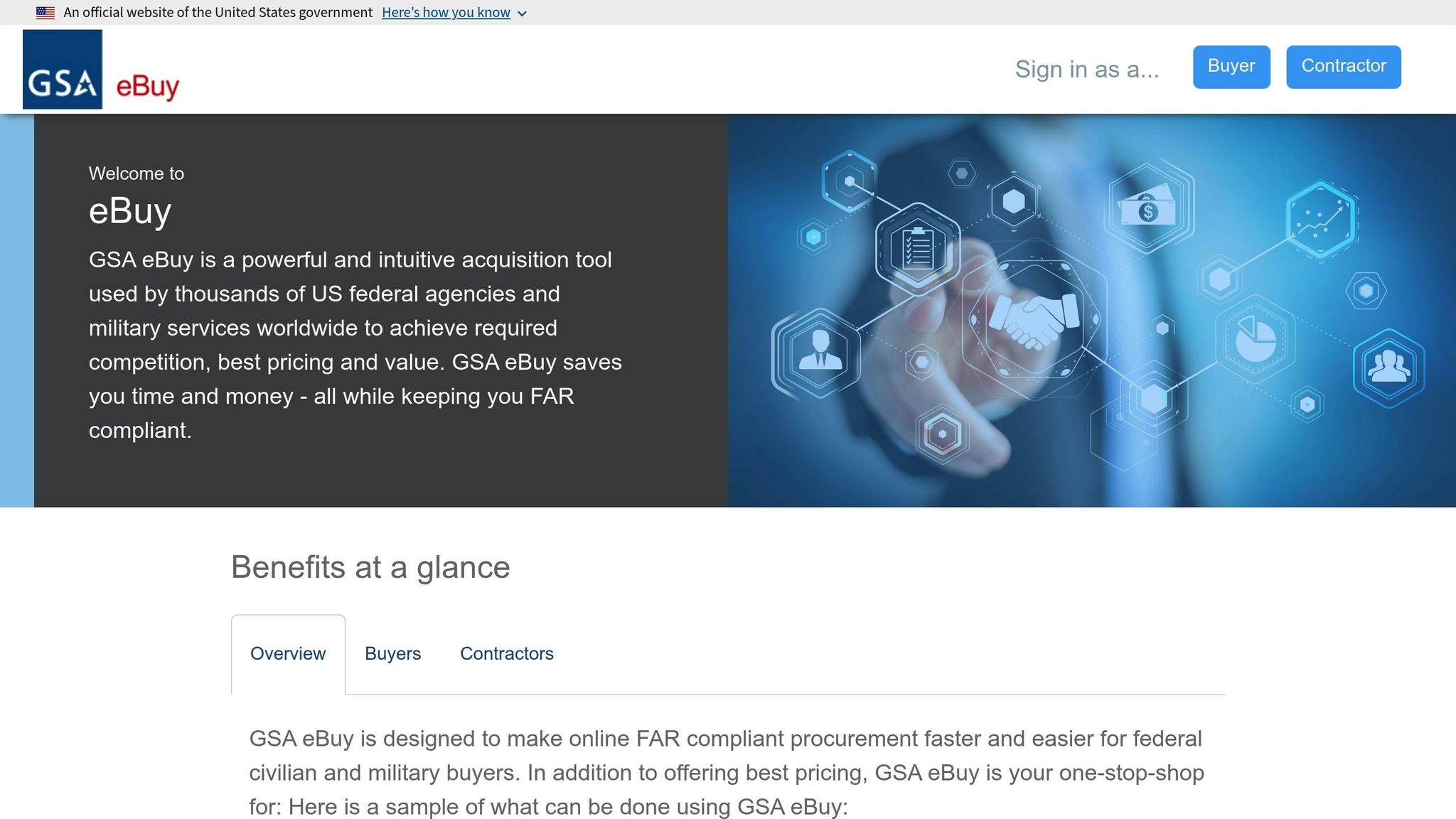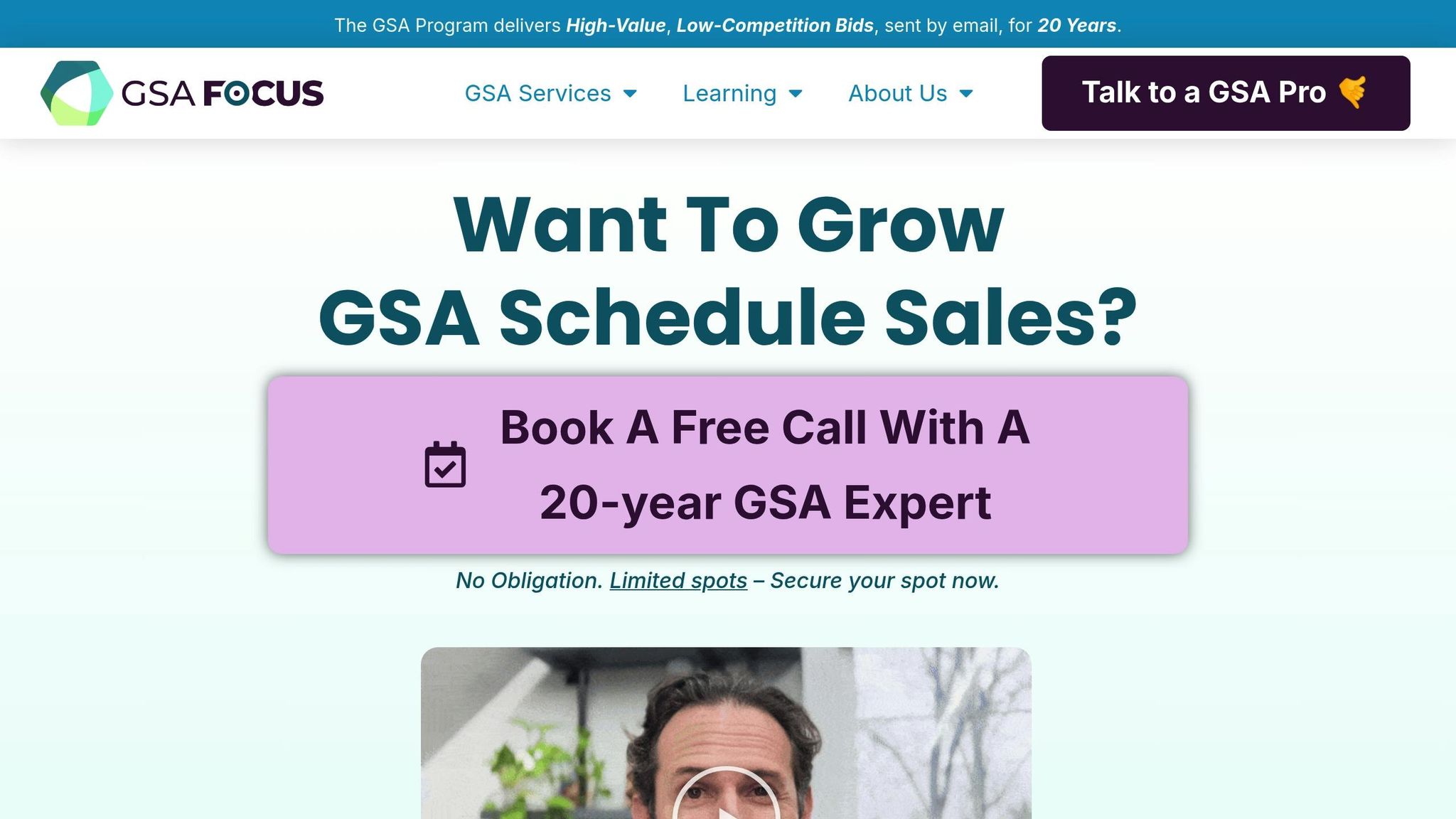If you’re aiming to secure a General Services Administration (GSA) Schedule contract, here’s what you need to know upfront:
- GSA Schedules: These are pre-approved vendor contracts for federal agencies, simplifying the procurement process for goods and services.
- Opportunities for Small Businesses: Over $39 billion annually is spent through GSA contracts, with many opportunities reserved for small businesses.
- Eligibility Basics: You must register on SAM.gov, have a Unique Entity ID (UEI), and meet financial stability and past performance requirements.
- Key Requirements: Financial health, compliance with federal regulations, and proof of experience are non-negotiable. You’ll also need to meet domestic content rules and provide competitive pricing.
This article breaks down the steps, documents, and compliance measures you need to qualify for GSA bids. Let’s get started!
Does Your Firm Qualify for a GSA Schedule Contract
Basic Requirements for GSA Bid Eligibility
Before diving into the GSA bidding process, it’s crucial to meet some baseline requirements. These qualifications ensure your business is prepared to participate in the $45 billion GSA Multiple Award Schedule program.
Business Registration and ID Numbers
The first step? Register your business on SAM.gov. This registration process gives you a Unique Entity ID (UEI) and assigns the relevant NAICS codes for your products or services. Think of the NAICS code as your business’s "industry label" – it determines which federal opportunities you qualify for and helps agencies identify vendors in specific sectors. Choosing the right NAICS codes is essential since they directly influence the Special Item Numbers (SINs) you can apply for under the GSA Schedule.
For businesses acting as sub-awardees, only a UEI is required. However, if you’re pursuing a full GSA Schedule contract, complete SAM.gov registration is non-negotiable.
Financial Stability Requirements
Once you’re registered, you’ll need to prove your company is financially sound. GSA performs detailed financial reviews to ensure contractors can meet their obligations and safeguard taxpayer dollars. To pass this review, you’ll need to provide at least two years of financial statements. Additional documents, like income and cash flow statements, may also be requested.
Here are some key financial metrics GSA evaluates:
| Financial Metric | GSA Preference | Why It Matters |
|---|---|---|
| Debt-to-Equity Ratio | Below 0.7 | Indicates manageable debt levels compared to ownership equity. |
| Current Ratio | Greater than 1.0 | Shows your ability to meet short-term financial obligations. |
| Working Capital | Sufficient reserves | Ensures you can handle large orders, even with payment delays. |
Beyond these metrics, there’s a performance benchmark to keep in mind: GSA Schedule contractors must generate at least $25,000 in annual government sales to maintain their contracts. For perspective, the average annual revenue for GSA Schedule contractors sits around $3 million.
If your business has faced financial challenges, such as losses or negative equity, don’t panic – this doesn’t automatically disqualify you. However, it may lead to additional scrutiny from GSA. A solid mitigation plan, along with strong reserves, access to credit, or investor backing, can help alleviate concerns.
Experience and Past Performance Records
After securing registration and demonstrating financial stability, the next step is proving your operational capability. GSA requires businesses to showcase relevant experience and past performance to ensure they can deliver on their chosen SINs. Typically, this means:
- At least two years in business.
- Financial statements and performance records from those two years.
Since October 2019, GSA has leaned on the Contractor Performance Assessment Reporting System (CPARS) to assess past performance. You’ll need to submit at least three CPARS reports from contracts or orders completed within the last three years. These reports should align with the services or products you’re proposing in your GSA application.
To strengthen your application, include detailed narratives of recent projects. Highlight key aspects like quality of delivery, timeliness, and cost control. The goal is to paint a clear picture of your ability to handle complex and relevant work.
For newer businesses that don’t meet the two-year experience requirement, GSA offers the Startup Springboard program. This initiative allows eligible startups to bypass some experience requirements, ensuring that newer, innovative companies aren’t left out of federal opportunities.
When submitting technical information, make sure it clearly demonstrates your ability to deliver on the SINs you’ve selected. Draw a direct line between your documented experience and the services you’re proposing under the GSA Schedule.
Required Documents and Compliance Checklist
Once you’ve confirmed your eligibility, the next step is to gather all the necessary documents to meet GSA standards. Missing even a single piece of information can delay or derail your application.
Technical and Pricing Documents
Start by using the official GSA technical and price proposal templates. Your proposal should address the four key factors outlined in SCP-FSS-001 Section II, presented in a narrative format with a 10,000-character limit in the eOffer system.
Your pricing must be competitive – either matching or beating your best commercial rates – and you’ll need to justify any higher rates. Clearly differentiate your commercial offerings from your federal proposal to ensure compliance with Most Favored Customer (MFC) pricing requirements for federal buyers.
If you provide services, include detailed Labor Category Descriptions that specify position titles, job responsibilities, required experience, and education levels. For product-based businesses, provide comprehensive product details, such as photographs, descriptions, dimensions, and, if applicable, a Letter of Supply from your manufacturer.
Also, make sure to include an Economic Price Adjustment (EPA) selection, which will allow for future price modifications.
Finally, ensure you meet all domestic content and regulatory standards.
Domestic Content and Regulatory Compliance
Compliance with domestic content rules is critical. Starting in 2025, federally funded projects will require all manufactured products and construction materials to meet a 65% domestic content threshold, which will increase to 75% in 2029. Additionally, structural iron and steel must be 100% melted and poured in the United States.
You’ll need to provide product origin certifications as part of your submission. Keep in mind that simple manufacturing or assembly certifications may not be enough to prove compliance with the Trade Agreements Act (TAA). To meet these standards, list each component’s country of origin and acquisition cost, and make sure your contract language references the appropriate clauses – FAR 52.225-1 for civilian contracts and DFARS 252.225-7000 for Department of Defense work.
Failure to comply could result in penalties under the False Claims Act or even suspension from federal contracts. For Department of Defense contracts, you’ll also need to assess risks related to Controlled Unclassified Information (CUI) and covered defense information (CDI).
Proof of Commercial Sales
The GSA requires proof that your pricing is rooted in a viable commercial market presence, not just tailored for government contracts. To meet this requirement, submit documentation that shows a clear connection between your proposed GSA pricelist and your current commercial pricing. Include supporting documents that validate your pricing and demonstrate your market activity.
As a GSA Schedule contractor, you’ll need to submit periodic sales reports to calculate the Industrial Funding Fee (IFF) on a regular basis. Below is an overview of the reporting schedule:
| Report Type | Due Date | Frequency |
|---|---|---|
| Non-TDR Contracts Sales Reporting/IFF Payment | April 30, July 30, October 30, January 30 | Quarterly |
| TDR Contracts Sales Reporting/IFF Payment | 30th of each month | Monthly |
| VA Sales Reporting Systems | February 28, May 31, August 31, November 30 | Quarterly |
| Service Contract Report (SCR) | October 31 | Annual |
To stay on top of these requirements, establish a compliance program. This should include systematic tracking of all relevant items, staff training on necessary procedures, and internal controls to ensure everything runs smoothly. A proactive approach like this can help you avoid compliance issues that could threaten your contract status.
sbb-itb-8737801
Steps to Prepare Your GSA Bid Submission
Once you’ve confirmed your eligibility and gathered all necessary documentation, it’s time to focus on crafting a strong submission. The GSA Schedule offer process is detailed and requires careful attention to avoid setbacks or rejection.
Review and Finalize All Documents
Every document in your submission needs a thorough review. Pay close attention to these three critical sections:
- Administrative Section: This part must clearly demonstrate your compliance with all required regulations.
- Technical Section: Highlight your company’s experience and qualifications, specifically tailored to the federal marketplace.
- Pricing Section: Provide detailed documentation to support "Fair and Reasonable Pricing."
Accuracy is key – missing or incorrect information can derail your submission. Have a qualified reviewer go over everything to ensure the documents are complete and meet all requirements.
Register and Use GSA eBuy

After securing your GSA Schedule contract, the next step is to register with the Vendor Support Center (VSC) and upload your catalog to GSA Advantage! This is essential before you can start bidding on opportunities through GSA eBuy. Access the system at ebuy.gsa.gov using your GSA FAS ID and contract number. The platform will notify you of Requests for Quotes (RFQs) that align with your GSA Schedule and SINs.
One helpful feature is the "Interested" button, which allows vendors to express intent to submit a proposal without committing formally. Clicking this gives buyers a heads-up about potential responses while affording you more time to evaluate the RFQ. Always review each Statement of Work (SOW) carefully and tailor your proposal to meet the solicitation’s specific requirements. Submitting quotes early can also give you an edge. Once you’re active on GSA eBuy, ensure your proposal is submitted on time to the buyer.
Submit on Time
Timely submission is non-negotiable – late bids won’t be considered. While you can submit an offer to join the Multiple Award Schedule (MAS) at any time, responding to specific opportunities comes with strict deadlines.
Keep a close eye on RFQ deadlines through GSA eBuy and set internal deadlines a few days in advance to account for any last-minute issues. Thoroughly review each solicitation, whether it’s an RFP, RFQ, sealed bid, or sources sought notice. Some opportunities may have competitive restrictions, such as small business set-asides or geographic limitations.
This final review ensures your readiness to compete effectively in federal contracting. Stay in regular communication with GSA during the evaluation process. Remember, GSA Schedule contracts last for five years, with the possibility of renewals extending the term to up to 20 years.
How GSA Focus Can Help with the Process

Navigating the GSA Schedule process can feel daunting, especially for small businesses tackling it for the first time. The intricate web of requirements, documentation, and compliance standards often creates hurdles that are tough to overcome. That’s where GSA Focus steps in – offering guidance and support to simplify the process and boost your chances of success.
Full-Service GSA Contract Support
GSA Focus provides an all-inclusive, done-for-you solution that takes care of every detail in your application. From start to finish, they ensure your submission aligns with GSA’s strict standards. This approach is particularly crucial given the high rejection rates caused by issues like incomplete paperwork, uncompetitive pricing, or non-compliance with GSA requirements.
One of their standout services is compliance assurance. GSA Focus stays on top of ever-evolving GSA guidelines, which shift in response to federal acquisition policies, technological changes, and market trends. They also offer negotiation support, working directly with GSA officials to address any questions or concerns that arise during the evaluation process.
Simplified Qualification Process
The traditional GSA Schedule application process demands time, effort, and specialized knowledge – resources many small businesses simply don’t have. GSA Focus simplifies this by offering customized solutions tailored to your business. They assess your readiness, identify the most suitable GSA Schedule, and craft a compliant proposal. This streamlined approach saves you months of work, allowing you to focus on running your business.
Their expertise doesn’t just save time; it also boosts your chances of success. By helping you sidestep common pitfalls like pricing errors, GSA Focus makes professional guidance an invaluable asset for first-time applicants. They also go a step further by offering staff education on post-award contract requirements. This ensures your team is equipped to manage the contract effectively, which is critical for staying compliant over the potential 20-year term.
Access to Federal Market Opportunities
Securing a GSA Schedule contract unlocks access to a $45 billion federal marketplace, positioning your business for long-term success with government partnerships. GSA Focus ensures your contract remains compliant and up-to-date with shifting federal requirements. This not only gives your business a competitive edge but also establishes you as a trusted partner for federal agencies.
From day one, GSA Focus ensures your contract presentation meets government expectations, setting you up for success. Their expertise in federal procurement helps position your services effectively within the GSA framework, increasing your visibility to government buyers. Once your contract is awarded, their support continues. They guide you on how to use tools like GSA eBuy, respond to federal opportunities, and build the relationships needed for sustained success in the federal contracting space.
In short, navigating the complexities of federal contracting requires more than just effort – it demands expertise. GSA Focus not only helps you overcome the challenges of the application process but also positions your contract for long-term success. Their tailored services pave the way for a smooth and successful journey into federal contracting, ensuring your business is ready to thrive over the years to come.
Key Points to Remember
Securing GSA bids comes with specific requirements that businesses must meet. First, your company needs to be registered in the System for Award Management (SAM), have a valid Unique Entity Identifier (UEI), and comply with the Small Business Administration (SBA) size standards for your industry. These steps lay the groundwork, but financial and compliance readiness are equally critical.
Strong financial health and comprehensive compliance documents are non-negotiable. The government expects proof of your ability to deliver, which includes maintaining sufficient liquidity and presenting clear financial records. Beyond that, a proven track record in your market can make or break your application. With around 10,000 companies applying for GSA contracts annually, only about 15% succeed on their first try. Missing documents or failing to meet compliance standards can quickly disqualify your bid.
For small businesses, the potential rewards are immense. In 2022, federal contracts totaled over $690 billion, with more than $159 billion specifically awarded to small business contractors. The GSA itself allocated $3.3 billion in contracts to small businesses during fiscal year 2023. Highlighting the importance of small businesses, Exodie C. Roe III, Associate Administrator of OSDBU, stated:
"A robust economy is built on expanding opportunities for small and socioeconomic small businesses. More than 50% of the country’s economic activity comes from small businesses. They create a lot of the local jobs in this country, driving innovation and supporting communities."
The federal government remains committed to increasing small business participation. Stephen Ehikian, Acting Administrator of the GSA, shared:
"We’re not just making it easier to do business with the government – we’re making it worth it. Our goal is to open the door wider to innovation, competition, and economic equity by ensuring federal contracting processes work for everyone, especially America’s small and disadvantaged businesses."
These insights underline the priorities for businesses aiming to qualify for GSA contracts. Achieving GSA approval not only provides access to steady revenue but also establishes credibility in both federal and commercial markets. While the qualification process may be rigorous, the long-term benefits make it a worthwhile investment for businesses committed to excelling in federal contracting.
FAQs
How do I register my business on SAM.gov to qualify for GSA bids?
To get your business registered on SAM.gov and become eligible for GSA bids, you’ll need to follow a few key steps. Start by gathering essential details, including your legal business name, Taxpayer Identification Number (TIN), and other relevant business information. As part of this process, you’ll also receive a Unique Entity ID (UEI), which is a must-have for federal contracting.
Next, complete your entity registration by filling out all the necessary forms and providing the required affirmations and certifications. Once your registration is complete, your business will be ready to compete for federal contracts, including opportunities with the GSA. Double-check that all the information you provide is accurate to avoid any unnecessary delays.
Can a startup or new business without two years of experience qualify for a GSA Schedule contract?
Startups or newer businesses with less than two years of experience can still pursue a GSA Schedule contract thanks to the Startup Springboard program. This initiative provides an alternative pathway for businesses to demonstrate their readiness to handle government contracts. Instead of relying solely on years in operation, startups can submit supporting documentation like:
- Key personnel experience: Highlighting the expertise and qualifications of team members.
- Financial stability: Providing evidence of sound financial health.
- Past performance on similar projects: Showcasing successful work completed in related areas.
These elements help startups prove they have the capability and resources to meet the demands of GSA Schedule contracts.
How can small businesses set competitive prices and stay compliant with GSA requirements?
Small businesses can navigate GSA pricing and compliance by focusing on a few smart strategies:
- Stay informed about market trends: Learn what federal agencies are looking for and how similar products or services are priced in the marketplace. This helps you align your offerings with current demands.
- Compare pricing effectively: Use GSA’s standard pricing as a benchmark to ensure your rates are competitive while still allowing for profitability.
- Offer discounts wisely: Provide discounts that meet GSA expectations, but make sure they don’t eat into your profit margins.
It’s also crucial to keep your documentation accurate and up-to-date to meet compliance requirements. Regularly reviewing GSA policies and maintaining open communication with your contracting officer can help you address any questions or adapt to changes in requirements.
Related posts
- How To Qualify for a GSA Schedule
- 5 Key Requirements for GSA Schedule Eligibility
- GSA Contract Eligibility: Key Requirements
- Checklist for GSA Construction Contract Compliance


